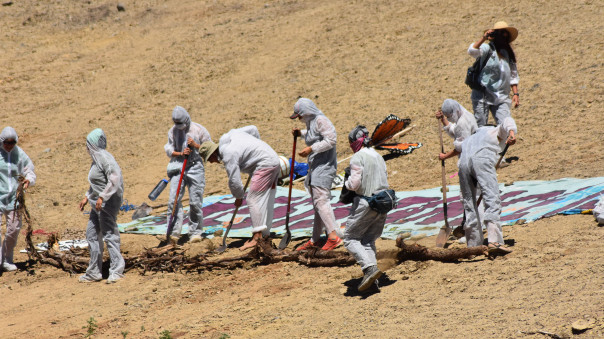SUNDAY JUNE 19, PR SPRINGS, UT: Thirty people walked onto the country’s first tar sands mine and sowed seeds to regrow land destroyed by tar sands – a fossil fuel more polluting than coal and oil. With butterfly puppets, songs, and banners, protesters trespassed onto the mine site and took the remediation of the stripped land into their own hands with shovels, pick axes and seed balls.
Evidently displeased with the sowing of native grasses and flowers, law enforcement intervened to arrest 20 of the planters, who banded together and sang until arrest. The action was planned by the Tavaputs Action Council, a coalition of grass roots social justice groups of the Colorado Plateau, and came as the conclusion to a 3-day event dedicated to celebrating land and biodiversity. Over 100 people participated, camping on public land next to the tar sands mine and attending workshops, panels, and music shows. People came together to hear about indigenous resistance to fossil fuels and colonialism, and to imagine a more equitable future together.

Canadian mining company US Oil Sands has leased 32,005 acres of public lands for oil shale development. In the future, 830,000 acres of public land could be at risk of irreversible tar sands strip mining in the western United States. Tar sands requites large quantities of water for processing into crude oil, putting extra pressure on a water system already under threat of running dry.
Kim, Nihigaal Bei Iina, said: “We must remember that if we do not fight we cannot win, we don’t even have a chance of winning. By planting seeds we have a chance of winning another round for mother earth, we still have more battles to fight within us. These seeds planted will harvest another generation of fighters and warriors.”
“The boom and bust failures of coal, tar sands, and oil shale show that we cannot rely on the fossil fuel industry to provide long-term jobs and a steady economy. We are demanding a ‘just transition’ away from subsidizing dirty energy and towards a stable and sustainable way of living,” says Moab resident and CCRT member Melissa Gracia. “That is an enormous task and yet people all over the world are rising to the occasion. We need policies and institutions to support a just transition and we are building the people power to make it happen.”
According to Will Munger, “All across the region people are facing a similar situation. Take for example the recent bankruptcy of Peabody Coal. They must be held accountable for their destruction of indigenous land on Black Mesa and we must ensure that the CEO’s don’t bail with bonuses while workers and local communities suffer. We must take the money generated by the fossil fuel industry to repair the land and water while supporting local communities’ transition away from a fossil fuel-dependent economy.”
The Tavaputs Action Council includes Canyon Country Rising Tide, Peaceful Uprising, Utah Tar Sands Resistance, Climate Disobedience Center and Wasatch Rising Tide.
